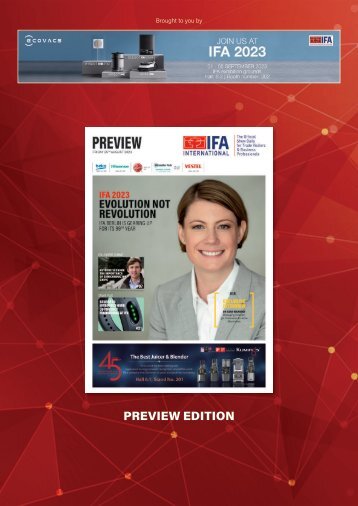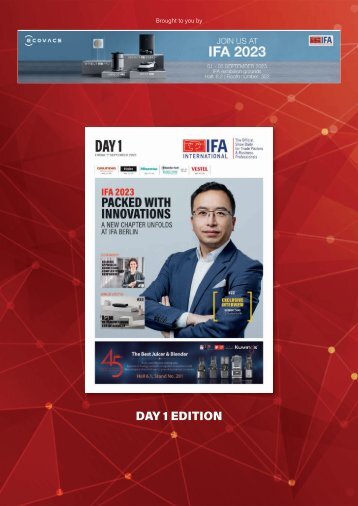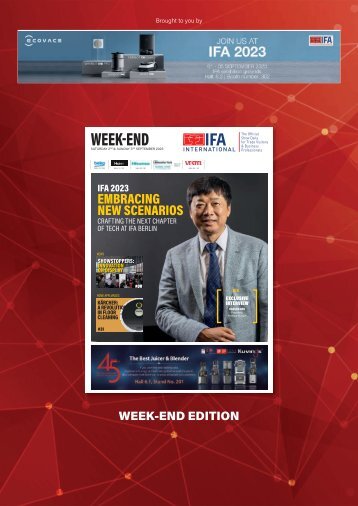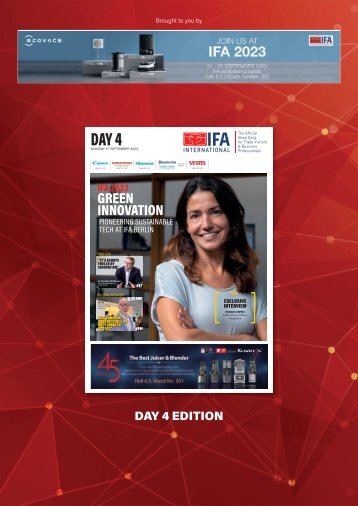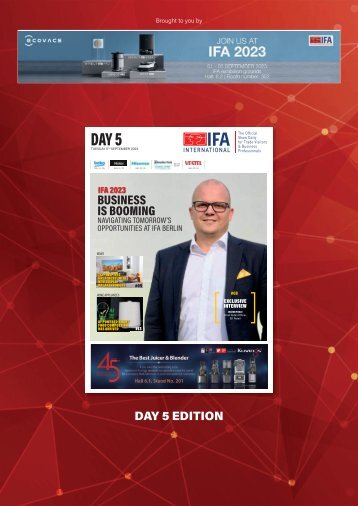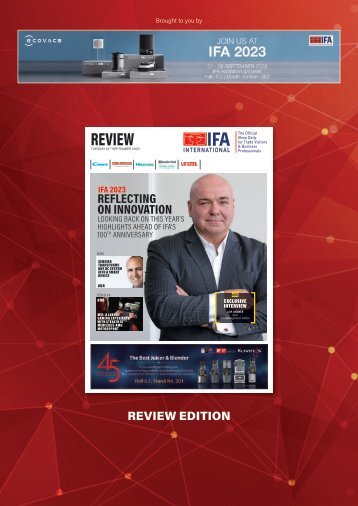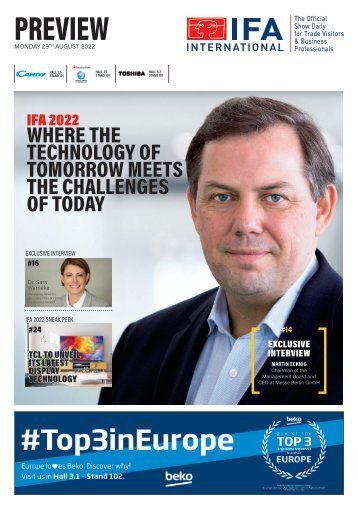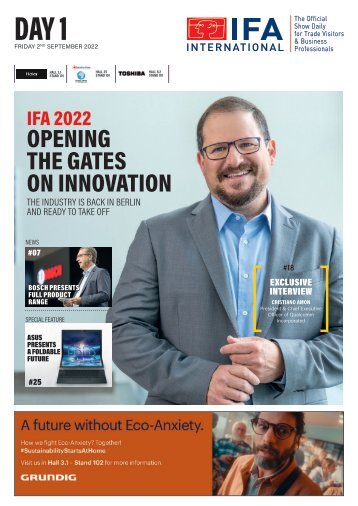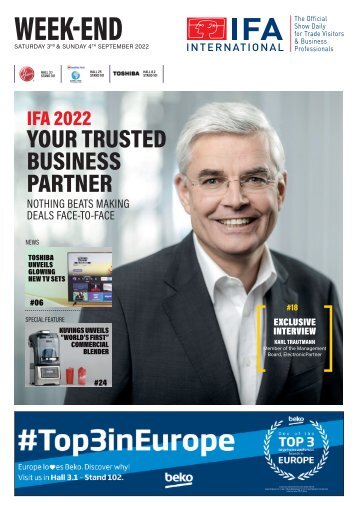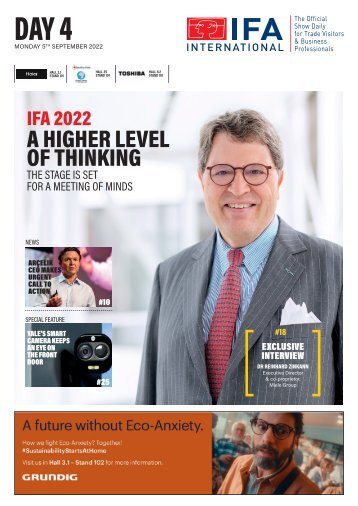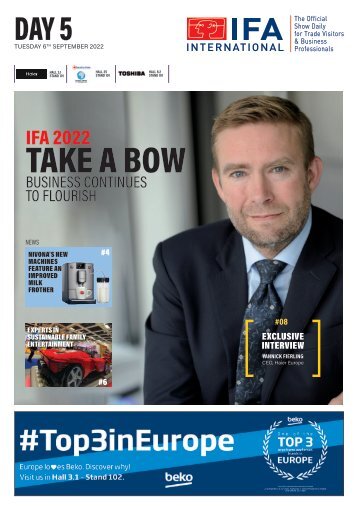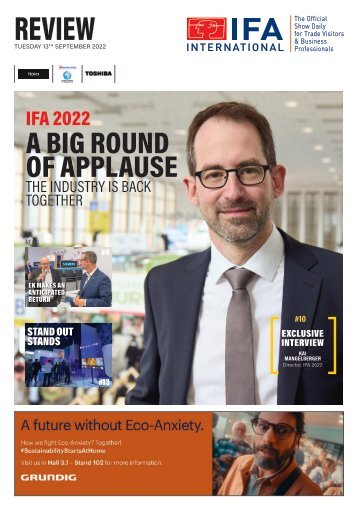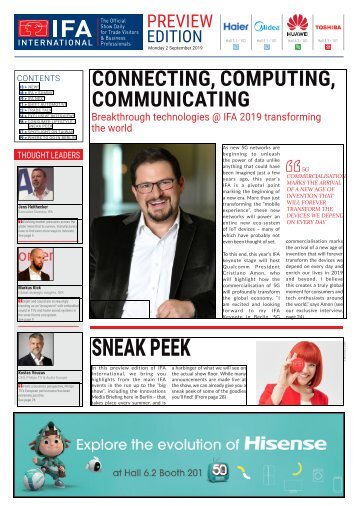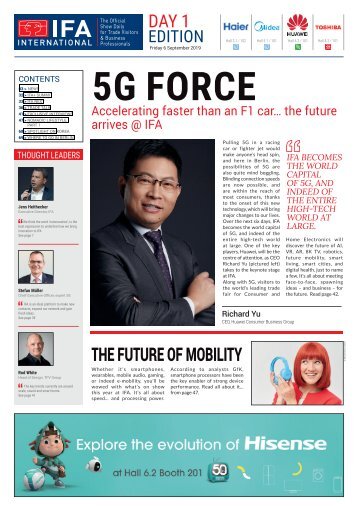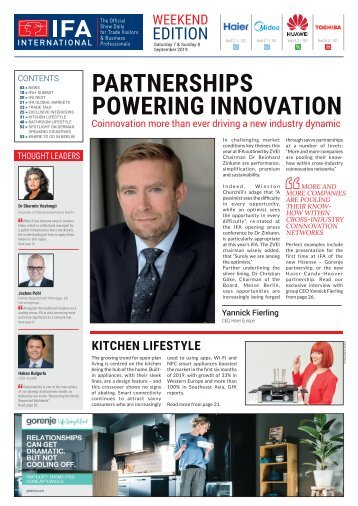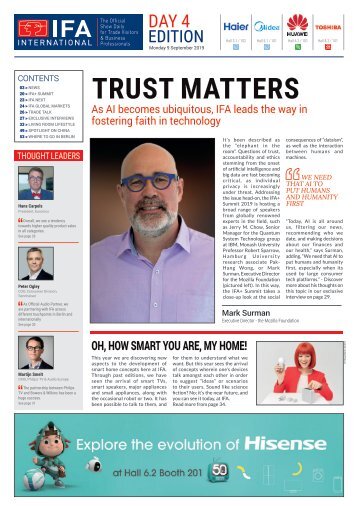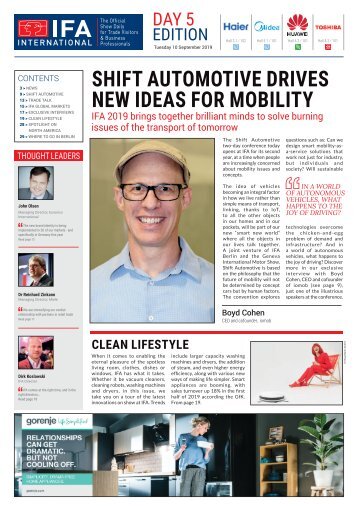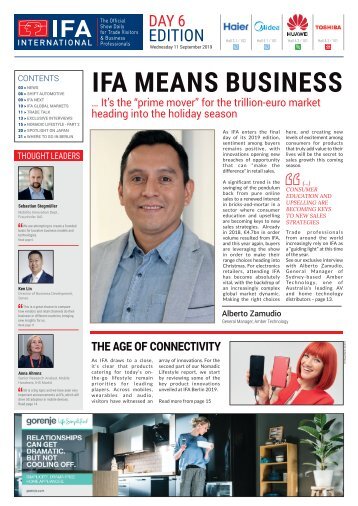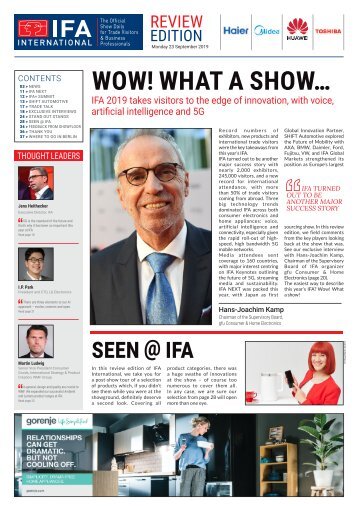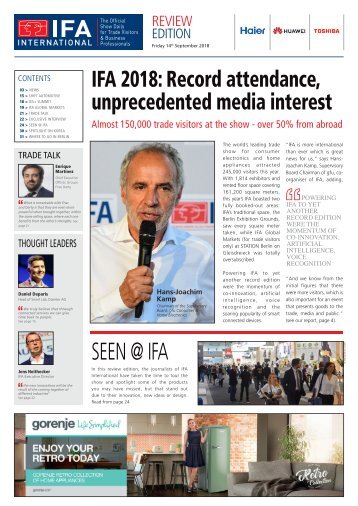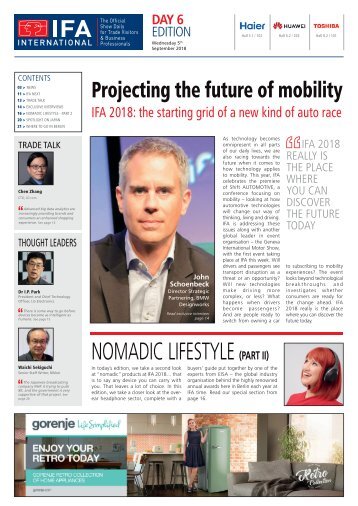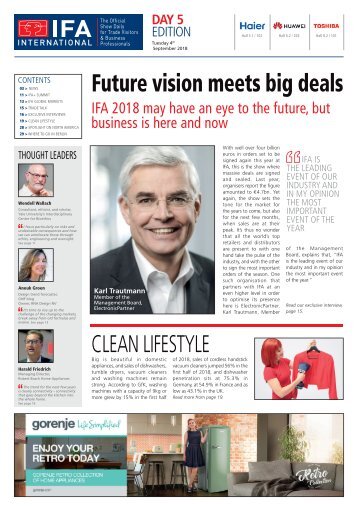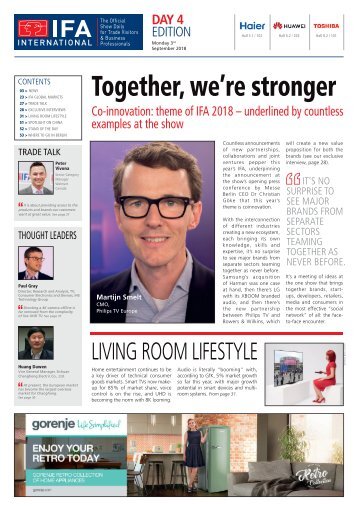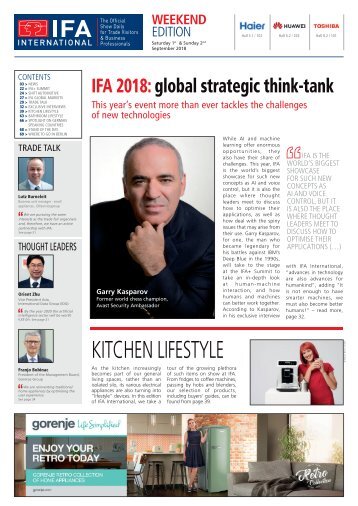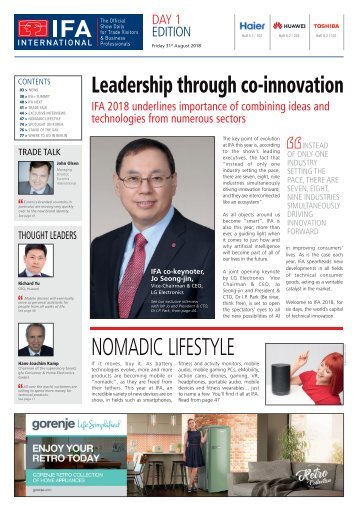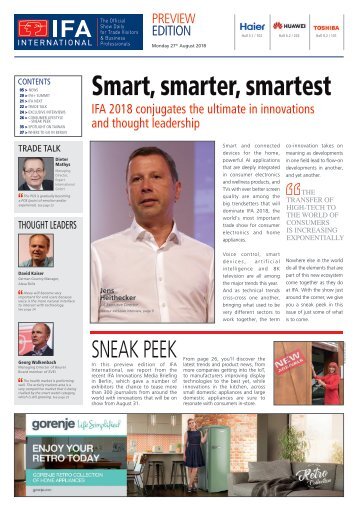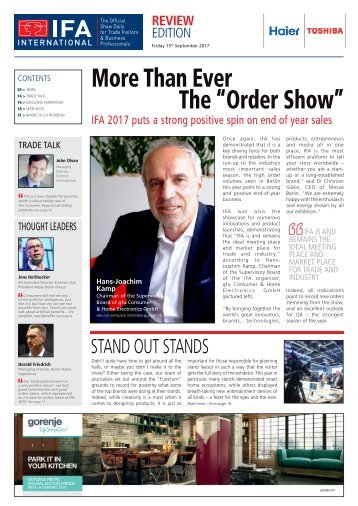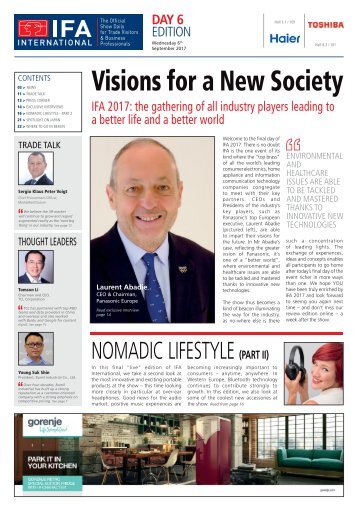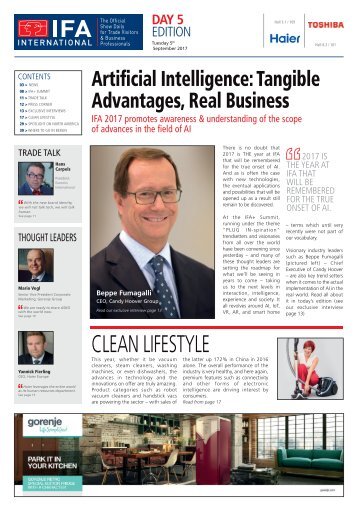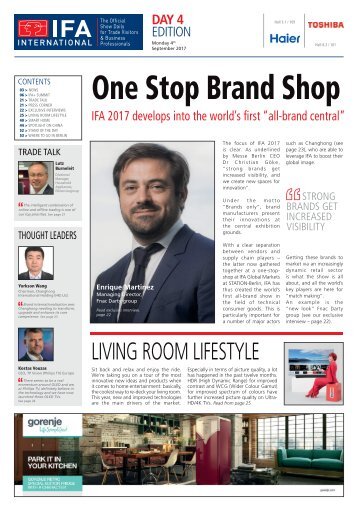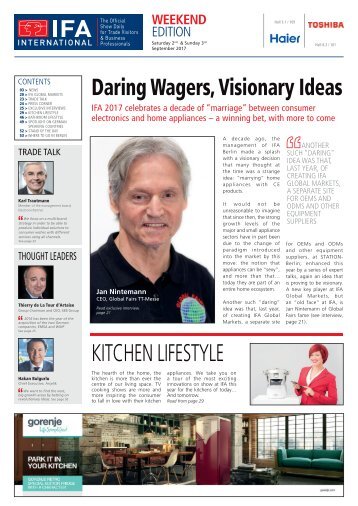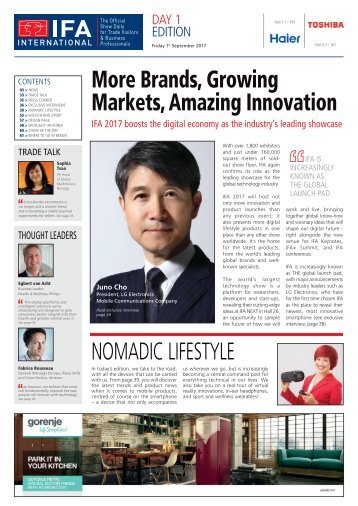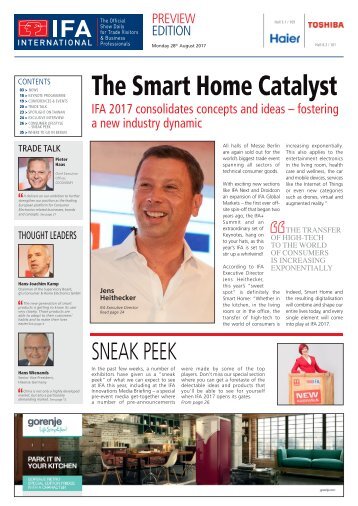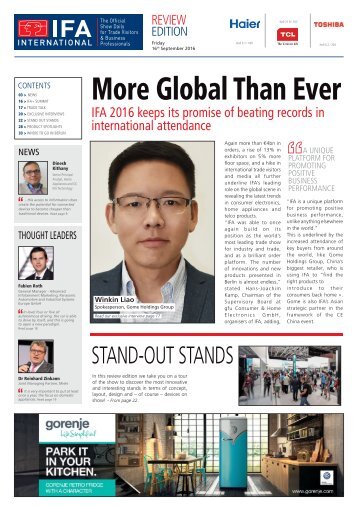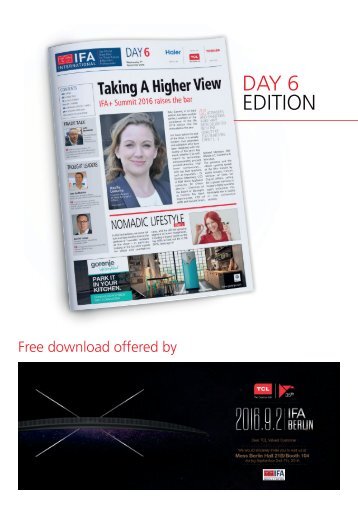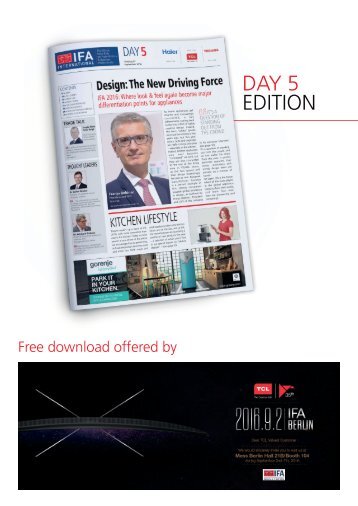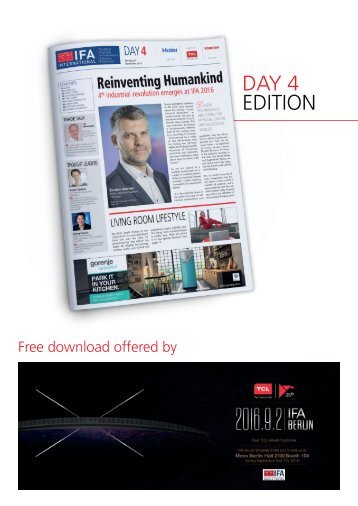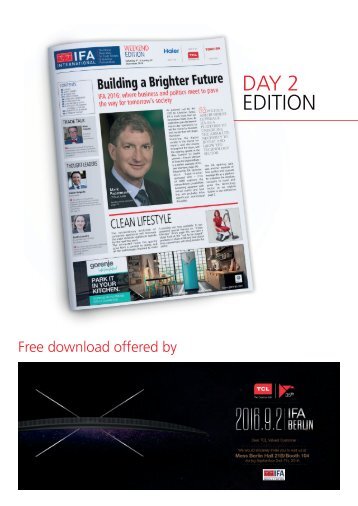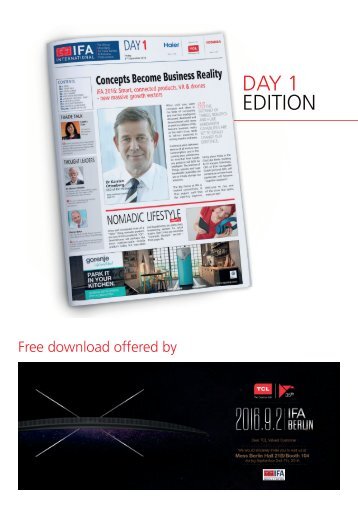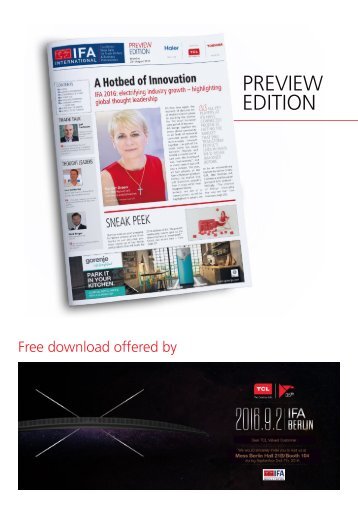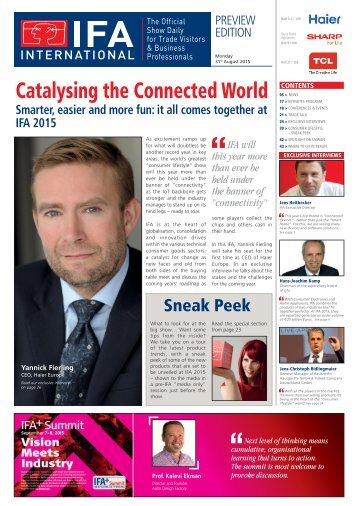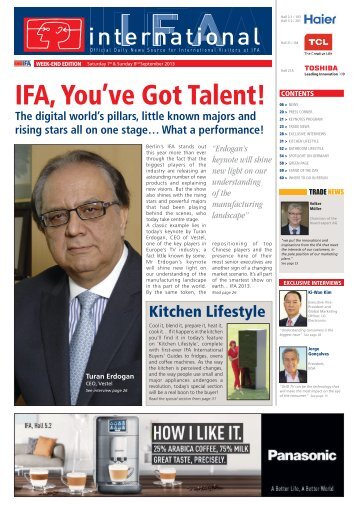
Day 1 - IFA International
- Text
- Products
- Consumer
- September
- Electronics
- Lifestyle
- Philips
- Consumers
- Sony
- Berlin
- European
- Www.cleverdis.com
Meet the visionaries
Meet the visionaries oFFerinG a neW kind oF LiFestYLe Philips Consumer Lifestyle celebrates its first birthday at IFA 2009. CEO Andrea Ragnetti talks to Richard Barnes about the 'sense and simplicity' that has characterised the sector's first year of operation. Philips Consumer Lifestyle has added a broad spectrum of consumerlifestyle products to its traditional consumer electronics range. How is this evolving? Last year, I told you about the birth of Philips Consumer Lifestyle, which is the sector for which I am responsible. As we move towards our second birthday, in January 2010, we are more and more focused on health and wellbeing. Within this vast domain, we have identified four key platforms for innovation and growth. We call them healthy life, personal care, home living and interactive living. The first one is our healthylife platform, which includes categories such as dental care, preventive health diagnostics, mother- and childcare, and lifestyle management. The personalcare segment is about looking and feeling good, and includes solutions in the areas of skincare, shaving, grooming, hair care and sleep. The third platform is home living, which includes categories such as coffee, water and air, indoor and outdoor cookery, and floor care. And finally, interactive living includes categories like home cinema, audio entertainment and lifestyle accessories. How is Philips' focus changing? Philips is transforming into a company focused on health and wellbeing, while delivering sense and simplicity. This applies across our three sectors: healthcare, lighting and lifestyle. In your keynote, you will be outlining the findings of a huge study that was undertaken by Philips this year. Without giving too much away, could you tell us a little more about this survey? This year, we embarked upon what we believe is one of the largest-ever consumerresearch studies in the in the field of health and wellbeing. We interviewed more than 8,000 consumers across the world. They confirmed that, for most consumers, health is a rational concept, while wellbeing is a more emotional concept. Health is about physical health - being sick or healthy. Wellbeing is about the little events in everyday life: sharing time with family and friends, having time off from a hectic schedule, and enjoying moments of comfort, fun and caring. What are some of the new product categories Andrea Ragnetti, Executive Vice-President and CEO of Philips Consumer Lifestyle raGnetti positions phiLips For a heaLthier, WeaLthier Future By Richard Barnes that are flowing from this research? The research has given us deep consumer knowledge, which is the basis of the innovation roadmap we have identified for our sector. This roadmap has resulted in the four consumer lifestyle platforms for innovation and growth mentioned above. When we look at these four platforms, we see a mix of existing businesses and embryonic or emerging growth areas. In order to capture opportunities in all these areas, we need to leverage resources and creativity within the Philips network. An example of an area in embryonic stage is sleep, which is a primary source of human vitality and health. Sleeping is also one of the top- 10 activities that contributes to people's wellbeing. Busy lifestyles, however, come with health risks caused by stress, poor sleep quality, bad nutrition and lack of activity. In the US, it's estimated that 65% of adults experience sleeping issues. Only one in five of those adults seeks help with their problem and, for those who do, 50% are prescribed pills they find ineffective. Lack of sleep can negatively affect behaviour and relationships. At Philips, we are looking at clinical and non-clinical solutions to this challenge. This area provides clear opportunities for crosssector co-operation with Philips Lighting. In the professional and homehealthcare areas, Philips knows a lot about sleep management, respiratory care and non-invasive ventilation for conditions such as sleep apnea. For those of you unfamiliar with the condition, apnea is where people stop breathing repeatedly while asleep as a result of a blockage of the upper airway. Between 18 to 20 million Americans suffer from the condition. 14 www.ifa-international.org IFA International • Friday, 4 th September 2009
Meet the visionaries Our recent acquisition of Respironics has driven our leadership in that field. At the level below clinical need, Philips is also creating solutions for millions of 'problem sleepers', or consumers who have occasional sleep issues. Light is a key factor in that strategy, with different types of light impacting on energy levels and the body clock. Our Wake-up Light is one example of how we are making a positive impact on sleep patterns. The light's function to help you to fall to sleep - the dusk function - and a function to support a better wake-up, which we call the dawn function. Some of you will remember from our Simplicity Event that we have been investigating the benefits of blue light for some time. The recent acquisition of Respironics has brought us new expertise, which helped us to launch goLITE BLU. This is a product that emits blue light - the same blue light as the summer sky. Researchers have shown that blue light is converted into the chemicals that help our bodies to be active and energetic, and may lead to better sleep. Blue LED technology was recently used by NASA to adjust researchers' body clocks, in order to keep the team synchronised for the Mars probe mission. Are there other examples of consumer lifestyle categories at embryonic stage? Yes - lifestyle management. According to the World Health Organization, we are now less active and more overweight than at any time in history. The WHO recommends at least 30 minutes of moderate to intense activity five times a week. The impact of this reduced activity can be seen in the rise of lifestyle-related diseases, such as cancer, obesity, heart disease and type-two diabetes, to name but a few. In fact, cancer is so prevalent that one in every two and a half people will suffer from it at some point in their lives. That means 27 million new cancer cases before 2030. People want to be more physically active, but most can't find the time. The first step we have made to help people improve their life quality is a personal coaching and service platform called DirectLife. This is based on the simple idea that 'what gets measured gets managed'. Here's how it works: DirectLife combines advanced technology - to track activity daily - with proven psychology in the form of step-by-step coaching. The solution shows you how to improve your physical fitness by making small changes to your daily routine. It can be as simple as walking in the park, biking to work or playing catch with your child. Based on your personal profile, DirectLife helps you to set balanced, achievable goals to become more active. It's not about sports - it's about learning how to gradually increase your everyday activity level and therefore to improve your fitness. DirectLife is being offered to companies on a group basis to boost employee fitness. It provides everything that's needed to get a company into shape. Your company has made a number of acquisitions in the fields of healthcare, lighting and consumer lifestyle over the past year. Could you please tell us more about these acquisitions and why you felt it was better to 'buy in' solutions rather than grow them in house? We engage in organic as well as inorganic growth. A recent example is our acquisition of Saeco International in Italy, which is one of the world's leading espresso machinemakers. This move makes us one of the leading coffeeappliance manufacturers in the world. It is also a category that has a very direct relationship with the wellbeing of people. Indeed, the acquisition of Saeco, along with the development of our Senseo range of coffee-makers, gives Philips a much stronger foothold in the 'coffee culture' sector. Through this acquisition, we are creating a new, dynamic market leader in coffee machines with excellent growth prospects for the future. It also makes total sense for Philips to establish a strong foothold in espresso machines. Our reputed and reliable brand in coffee appliances puts us in an excellent position to win in this space. With Saeco, we have acquired a company with massive experience and credibility in the espressomachine market and a strong management team, which has agreed to stay on following this acquisition. I believe Saeco's expertise and technical know-how, coupled with Philips' strong marketing and sales capabilities, will create a winning combination, allowing us to capitalise on the completely renewed range of espresso machine propositions that Saeco will be launching from September onwards. The enjoyment of quality coffee, along with the pleasant and positive experience this can create for consumers, ties this acquisition to the very heart of Philips' strategy to become the leading company in heath ahnd wellbeing. At the same time, the acquisition of Saeco is a real step forward in further positioning the Consumer Lifestyle sector for the future. We are now clearly entering a new phase of this process." Why do you think coffee drinking is becoming so much more important as a social activity? Attitudes to coffee vary widely from culture to culture, and individual preferences can change depending on the time of day. What's more, consumer tastes and preferences are constantly evolving. As a result, tracking consumer trends as they emerge is at the heart of Philips' strategy, enabling the identification of new markets and new opportunities for innovation. The home coffee market can be divided into several categories: instant, multiserve or drip-filter, singleserve open systems, singleserve closed systems, single serve espresso capsules and fully automatic espresso. Philips has a solution for consumers in each category. The espresso machine segment is generally regarded as the most valuable market space within the global coffee-appliances market, as it typically achieves doubledigit sales growth and profit margins. What strategy would you recommend for surviving the current economic slump? Forecasts about the impact of the financial crisis on the consumer industries remain unclear, but there are some small indicators of improvement in some markets. But to emerge stronger from the present downturn, the consumerproducts industry needs to return to the basics - delivering superior value to consumers, identifying new markets, creating new categories and running leaner organisations. Hall 22 / Stand 101 IFA Intl Keynote 2009 Andrea Ragnetti, CEO Philips Consumer Lifestyle 4 th September 2009 - 9:45 to 10:30 Philips Consumer Lifestyle focusing on consumer health and well-being. IFA International • Friday, 4 th September 2009 www.ifa-international.org 15
- Page 1: IFA 2009 - A New Dimension for the
- Page 5: news IFA wILL COnTInUe TO 'DeFIne T
- Page 8 and 9: conference & event IfA InternAtIonA
- Page 10 and 11: SPECIAL FEATURE - 3D comes alive! 3
- Page 12 and 13: sPeCIAL feAtUre - 3d Comes ALIve Wh
- Page 16 and 17: Meet the visionaries Exclusive Inte
- Page 19: PRODUCT TRENDS SONY SETS OUT OBJECT
- Page 23: PRODUCT TRENDS SAMSUNG TAKES THE LE
- Page 26 and 27: PRODUCT TRENDS NEW NAVIGON FUNCTION
- Page 29 and 30: PRODUCT TRENDS MIXING IT WITH DE'LO
- Page 31 and 32: SONy'S GREEN COMMITMENT IS “PART
- Page 33 and 34: trade news Increase In retaIl trade
- Page 35: trade news the reseller Park at IFa
- Page 38: going out > solar Bar Feel at home
Inappropriate
Loading...
Mail this publication
Loading...
Embed
Loading...

IFA International
- IFA International 2023
- IFA International 2022
- IFA International 2020
- IFA International 2019
- IFA International 2018
- IFA International 2017
- IFA International 2016
- IFA International 2015
- IFA International 2014
- IFA International 2013
- IFA International 2012
- IFA International 2011
- IFA International 2010
- IFA International 2009
- IFA International 2008
- IFA International 2007
